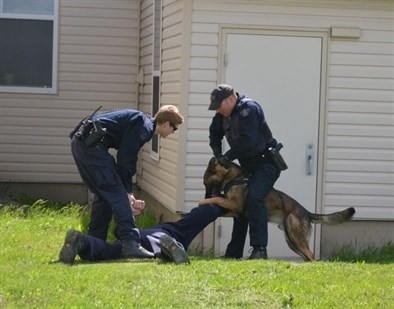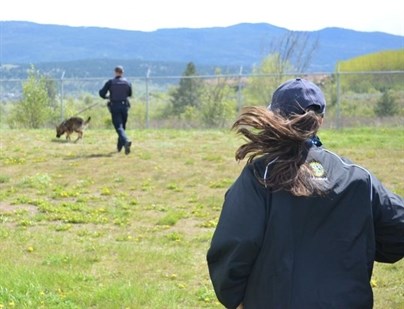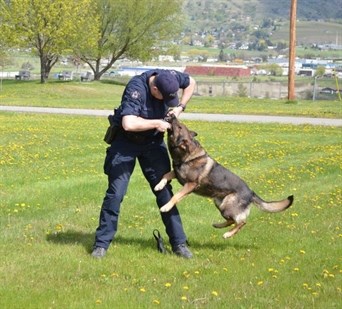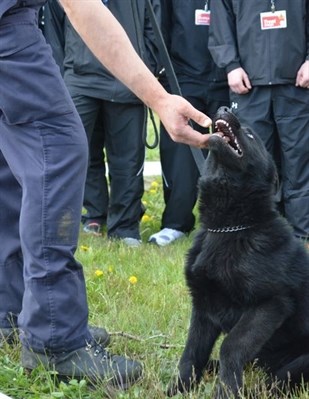
Const. Kevin Rutten and his police dog Cain take down the culprit of a simulated break-and-enter.
(CHARLOTTE HELSTON / iNFOnews.ca)
April 30, 2013 - 5:13 PM
Often, all it takes is a bark to jolt a pair of hands in the air. But police dogs know how to bite too, and a group of eager young cadets got to see them in action today as part of Vernon's RCMP youth academy program.
Const. Kevin Rutten, with the canine unit, recalls arriving at a bar fight years ago with his four-legged partner. All it took was a yip and yowl, and the group of brawling bikers began to cooperate.
In a demonstration today at the Vernon Army Camp, grade 11 and 12 students from across the Okanagan got to see just how fearsome police dogs can be.
Rutten and his dog Cain, a German Shepherd, led the group sprinting around the camp until Cain's nose found what it was looking for: a cop, up to no good, attempting a simulated break-and-enter.
Moments before the exhilarating chase, the cadets were seated in a classroom learning some theory behind the art of canine policing.
Cpl. Richard Gingras, who has been in the dog unit for many years, spoke passionately about the job.
"I don't like the office, I like action," Gingras said. "That's why I got into the dog section, we deal with the dangerous stuff."
Police dogs start their training at eight weeks old. RCMP use German Shepherds only, because of their ability to perform in various weather conditions, and for their aptitude in learning various skills. All dogs are trained to track people, but only some to sniff out narcotics and bombs.
"Our dogs are so good, you can grab a rock, throw it, and get the dog to find it," Gingras says. "Your scent is like a fingerprint to the dogs."
In addition to tracking the smell of a person, the dogs are also trained to pick up on disturbances on the ground.
"If someone was running through a field, grass would get broken, and the dog can smell that freshly cut grass smell," Gingras says, adding his longest track with a police dog was 14 kilometers.
Occupational scents—gasoline on a mechanic, perfume on someone who works in the beauty department—also aid the animals in closing the gap between cops and those they're searching for.
The best landscape for police dogs is the bush. There's more possibility of disturbance and of the individual touching branches or the ground along the way. In the city, on surfaces like pavement, things are harder.
All that running, jumping, and scaling mountains is tough on the dogs. By eight, they're ready to retire, but most handlers keep them around, and even bring them on rides from time to time.
"These dogs love to work," Mark Jones, also with the canine unit, said. "They're not house pets lying around on comfy cushions in the house."
Something Cain proved with teeth bared and tail wagging. In one quick lunge, Cain had his suspect pinned on the ground.
A few minutes later, Rutten had him calmly lying on the grass—though his eyes never left the man he'd just dragged down.
"Dogs will only bite for three reasons: if they're commanded to, if they're attacked, or if their handler is," Rutten said.
Canada is known for its rigorous program that only lets select dogs through. Those that don't make the cut are sold as highly trained family pets.
By the end of the demo, the cops had at least one young woman interested in joining the canine unit.
"I really love animals, I feel like it would be a great experience working with the dogs," Danielle Orr, an 18-year-old from Kelowna says. "I like the adrenaline rush, but also building a relationship with an animal is a great thing."
Gingras says it's not easy getting into the canine unit, but well worth it once you get there.
Canine training is just one area cadets get to explore as part of the Jean Minguy Memorial Youth Camp. Up to 40 students are immersed in the mini training camp which gives them the chance to learn about defense tactics, polygraph tests, and the art of bed-making, among a range of other things.
The camp runs until Saturday, May 4.
To contact the reporter for this story, email Charlotte Helston at chelston@infotelnews.ca or call (250)309-5230.

Danielle Orr, of Kelowna, keeps close behind as Cain leads the group on a sprint around the army camp.
(CHARLOTTE HELSTON / iNFOnews.ca)

Const. Mark Jones says the canine unit is hard work, but he'd never go back.
(CHARLOTTE HELSTON / iNFOnews.ca)

A young police pup learns to bite gently, for now.
(CHARLOTTE HELSTON / iNFOnews.ca)
News from © iNFOnews, 2013